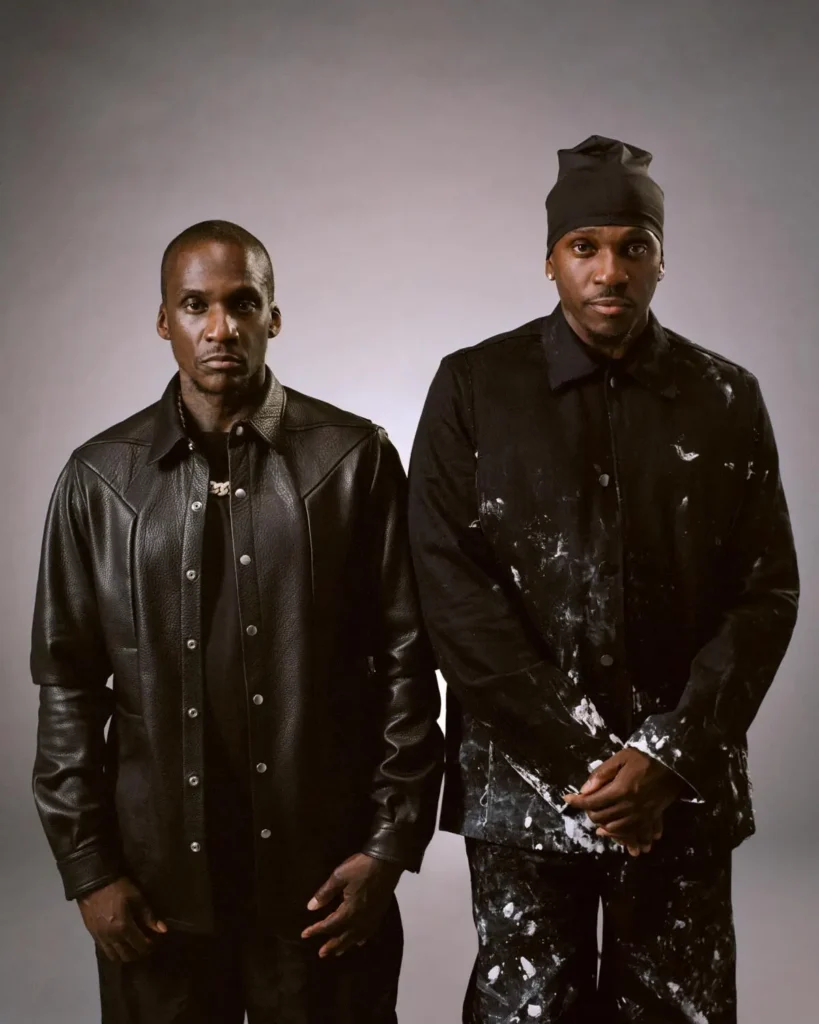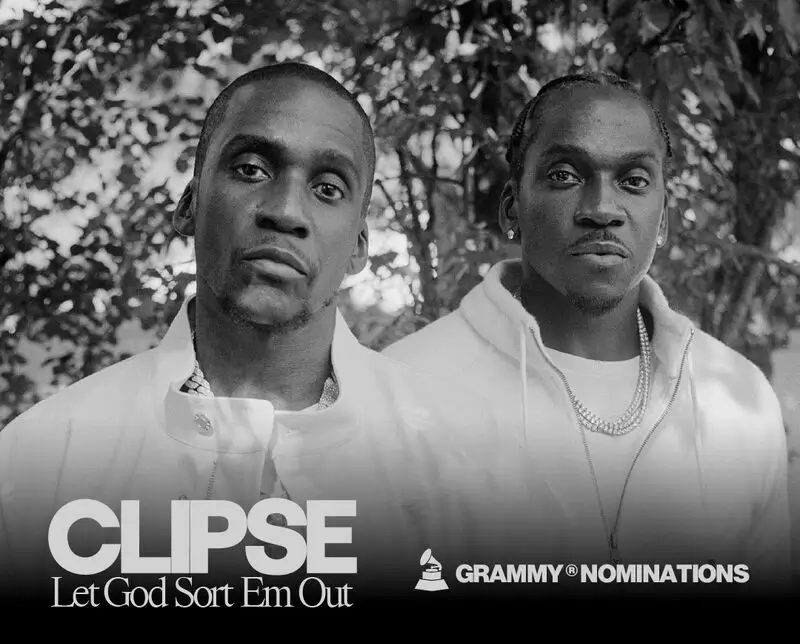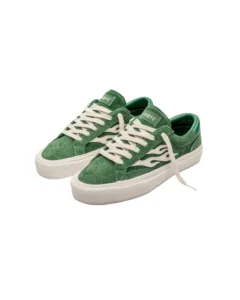When the Recording Academy announced the nominations for the 68th Annual Grammy Awards, few names resonated as powerfully as Clipse The Virginia Beach duo—Pusha T and Malice—earned five nominations across major categories, marking one of hip-hop’s most remarkable comeback moments of the decade. Their recognition is more than just a personal victory; it’s a reflection of the culture’s evolution, the resilience of legacy artists, and the institutional acknowledgment of street-rooted authenticity finally meeting the gilded gates of the mainstream.
This is not merely a case of nostalgia finding its way back to the spotlight. The nominations for Let God Sort Em Out, their 2025 album produced entirely by Pharrell Williams, represent a precise recalibration of purpose. It’s the culmination of decades spent perfecting the intersection of raw lyricism, sonic futurism, and cultural storytelling.
leg
Clipse’s story begins in Virginia Beach in the mid-1990s. The brothers Terrence “Pusha T” Thornton and Gene “Malice” Thornton Jr. emerged from a creative environment that would soon give rise to The Neptunes and Pharrell Williams’ new era of minimalistic, futuristic production. From the beginning, Clipse understood the importance of tone, rhythm, and coded street poetics. Their 2002 debut Lord Willin’ was a revolution in diction and mood, its cocaine-era metaphors layered with clever double meanings that mirrored both the ambition and paranoia of street life.
Their sophomore effort, Hell Hath No Fury (2006), is often cited as one of hip-hop’s most technically sharp and emotionally complex records. The production—icy, skeletal, perfectly tense—matched their lyrical ferocity. It became a blueprint for artists like Kendrick Lamar, Freddie Gibbs, and even Kanye West. Despite critical acclaim, however, Clipse rarely received institutional validation from the Grammys, which at the time struggled to reconcile underground realism with mainstream radio polish.
Malice’s eventual departure from the industry in 2010, driven by spiritual transformation, contrasted with Pusha T’s continued dominance in solo form. Yet, beneath the surface, their synergy never dissolved. The Grammy nods now stand as evidence that their reunion wasn’t nostalgia—it was unfinished business.
let god sort em out
Released in July 2025 under Columbia and Columbia Pharrell’s i am OTHER imprint, Let God Sort Em Out is both a statement of faith and defiance. Recorded in Paris, partly at Louis Vuitton’s headquarters under Pharrell’s creative direction, the album exists at the crossroads of sacred reflection and cultural spectacle.
The album opens with the haunting “Mass Appeal,” where Pusha and Malice confront the concept of judgment—divine and earthly—over a sparse Neptunes drum pattern. “The Birds Don’t Sing,” featuring John Legend and the Voices of Fire choir, brings gospel tones into a world-weary reflection on fame, vice, and survival. “Chains & Whips,” a standout collaboration with Kendrick Lamar, threads together generational storytelling with luxury’s ironies—how bondage can become aesthetic when history repeats itself.
Pharrell’s production throughout is restrained yet monumental, balancing clean textures with dusty percussion and cosmic synth lines. There’s a distinct absence of trend-chasing. Instead, Let God Sort Em Out sounds like two men using maturity as a weapon.
nom
The five Grammy nominations span both genre-specific and general-field categories. Let God Sort Em Out is up for Album of the Year and Best Rap Album. “Chains & Whips,” featuring Kendrick Lamar, is recognized in Best Rap Performance. “The Birds Don’t Sing” is nominated for Best Rap Song, and “So Be It,” directed by Omar Jones, lands in Best Music Video.
These nominations represent a symbolic closing of the circle. Hip-hop—particularly the hard-edged, non-pop form that Clipse helped pioneer—has historically been excluded from the Grammys’ upper echelons. The Recording Academy’s acknowledgment signifies both an evolution in taste and a rectification of cultural oversight.
For Clipse, the nominations are not a coronation of past glory but proof that craft and clarity still triumph over spectacle. In a year dominated by maximalist rap aesthetics and social-media celebrity, Let God Sort Em Out feels monastic—focused, pared down, human. It re-asserts the idea that hip-hop, even when minimalist, can still command luxury and legitimacy.
flow
This year’s Grammy lineup marks one of the Academy’s most balanced approaches to rap in recent history. Alongside Clipse, other nominees include Tyler the Creator, Doja Cat, and Kendrick Lamar—all artists whose work merges introspection with spectacle. Yet Clipse’s nominations carry particular historical resonance. Their story represents the persistence of Black Southern artists who built empires outside of traditional industry hubs.
Virginia Beach’s transformation into a global creative corridor owes much to Clipse and Pharrell. Before Atlanta took dominance and before New York’s drill revival, Virginia had already demonstrated that regionalism could thrive within globalism. These nominations re-center that legacy. They remind the industry that innovation often emerges from places the spotlight once ignored.
Institutionally, it also marks a subtle shift in how authenticity is rewarded. In the past, the Grammys often gravitated toward crossover acts. By contrast, Let God Sort Em Out is distinctly uncommercial. Its success rests on conviction, not concession.
partnership
The chemistry between Pusha T and Malice remains nearly telepathic. Age has stripped neither of sharpness nor edge. Their cadences—Pusha’s clipped arrogance and Malice’s deliberate introspection—now complement one another like thesis and antithesis. The interplay suggests something beyond music: a reconciliation between worldviews, faiths, and philosophies.
When they perform together, it’s less about spectacle and more about balance. Malice’s newfound calm anchors Pusha’s relentless energy. The result is emotionally complex, spiritually aware hip-hop that speaks to generational listeners. It’s no coincidence that fans in their thirties and forties find deep resonance here. In an age obsessed with virality, Clipse deliver something timeless.
the pharrell factor
Pharrell Williams remains Clipse’s silent architect. His fingerprints are on every moment of their history, from “Grindin’” to Let God Sort Em Out. As Louis Vuitton’s Men’s Creative Director, Pharrell’s presence expands the visual and cultural language around their comeback. The album’s rollout blurred the boundaries between music, fashion, and fine art—releasing in tandem with visual exhibitions, limited vinyl collaborations, and capsule fashion drops.
In this way, Let God Sort Em Out functions as a cross-disciplinary work. It aligns with how you, as a creative publisher, interpret the convergence of media, commerce, and art. The project’s narrative fits seamlessly into the broader conversation of “cultural production as design.”
beyond the music
What’s striking about Clipse’s resurgence is how effortlessly it extends beyond sound. Their visuals are crisp and cinematic, often echoing themes of repentance and resurrection. The “So Be It” video, nominated for Best Music Video, juxtaposes faith imagery with stark urban scenes, translating spiritual tension into visual poetry.
Their reemergence also taps into fashion and lifestyle culture. Pharrell’s role ensures that the Clipse aesthetic aligns with contemporary luxury codes—tailored streetwear, sculptural eyewear, metallic accessories, and minimalist color palettes. It’s no longer just “coke rap.” It’s existential luxury.
The duo’s recent GQ Men of the Year cover amplified this transformation. Pusha and Malice stand not merely as rappers but as designers of a narrative: redemption as aspiration. Their style is as much part of the art as the music itself.
tension and critique
Critical reception has been largely glowing, though some argue that the album’s polish occasionally distances it from the grit that once defined their essence. Others praise precisely that refinement—reading it as maturity rather than compromise.
For the Recording Academy, these nominations may also serve as redemption. For decades, the Grammys have been criticized for misunderstanding rap. Awarding Clipse signifies an attempt to bridge that historic gap, validating artists whose craft often lives outside radio comfort zones.
Still, the question remains: will the Grammys follow through with wins? Recognition is only half the equation; the industry still needs to reconcile its relationship with the art form it long marginalized.
style
For storytellers, curators, and brand architects, Clipse’s moment provides an exemplary case study in the art of return. Their resurgence wasn’t built on nostalgia tours or algorithmic strategies—it was anchored in consistency, design, and purpose.
From an editorial standpoint, their five nominations are rich with thematic material. The dualities are endless: faith and sin, commerce and conscience, heritage and futurism. Each layer offers potential for in-depth features, long-form visual essays, or digital campaigns.
For SEO framing, “Clipse Grammy nominations 2026,” “Clipse Album of the Year Let God Sort Em Out,” “Pusha T Malice comeback,” and “Pharrell Clipse production” are natural focus key phrases. Alt-text for visuals—such as Clipse performing live at the Vatican concert 2025, Let God Sort Em Out artwork by KAWS, and Pharrell in studio with Clipse—reinforce this intersection between visual culture and sound.
fin
“Congrats to Clipse” has become more than a social-media headline. It is a moment of cultural correction. Five Grammy nominations for Let God Sort Em Out confirm that the long arc of hip-hop history bends toward recognition for those who never compromised artistry for approval.
For Clipse, this is not a comeback—it’s a continuation of a conversation they began twenty years ago about truth, value, and vision. They have re-entered not as underdogs, but as elder statesmen whose craft commands respect.
Theirs is a story about endurance and evolution, about finding divinity in detail, and about the world finally catching up to what Virginia knew all along.
Clipse’s five Grammy nominations are a salute to the culture that raised them, a testament to their creative partnership, and a promise that legacy, when built on purpose, always finds its audience.
No comments yet.









